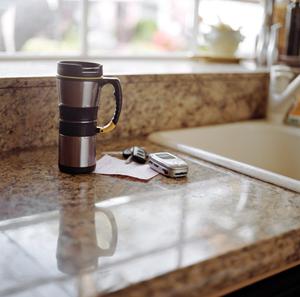From an installer’s viewpoint solid surface is very similar to wood with regard to its ability to be cut and joined. Seams are virtually invisible which allows large expanses of countertop space to be connected with no visible joints.
This nice feature also means that a solid surface sink can be joined to the countertop for a seamless installation, with no discernible edge between the countertop and the sink.
Material – It’s Chemistry (Along With Some Practical Applications)
Solid surface is made up of two main constituents called a “filler” and a “binder”. The filler in most cases is a substance known as “ATH” or Alumina Trihydrate. ATH is a natural mineral that’s in the form of a white powder when used in the manufacture of solid surface.
This sometimes results in scratches that show up as white or light-colored lines, particularly in darker surfaces. The scratch accentuates the ATH used in the makeup of the surfacing material. ATH is also a natural fire-retardant which gives solid surface countertops good fire-resistance.
The binder that’s used to hold the ATH and any other secondary ingredients together is a resin that’s either pure acrylic or polyester or a combination of both. This is another important point because there are differences between the two materials. Each has its own characteristics that impact the look, fabrication and in some cases, the durability of the solid surface.
Acrylic
Acrylic-based material was the first type of solid surface, formulated by the DuPont® company. Acrylic enjoys several advantages over polyester in that it’s harder, more impact resistant and less brittle than polyester. It won’t fade or discolor from exposure to ultraviolet light whereas polyester has less resistance to UV light.
Acrylic also has greater thermoformability – meaning it can be formed and shaped with heat more easily than polyester. This is important during the fabrication of your countertops should your design incorporate any bends or other features that require the material to be formed.
Polyester
Polyester on the other hand is more chemical resistant particularly with regard to acrylic-based chemicals such as acetone and nail polish remover. Polyester can also achieve a higher polish than acrylic and offers a greater ability for achieving a translucent effect. Some manufacturers like Avonite® use polyester specifically to obtain countertops with these qualities. Polyester costs less than acrylic so in general, polyester-based solid surface is cheaper than acrylic-based products.
Beyond these main ingredients solid surface manufacturers include numerous additives aimed at enhancing various aspects of the material. Each has their own “recipe” based on various attributes they’re trying to achieve.











